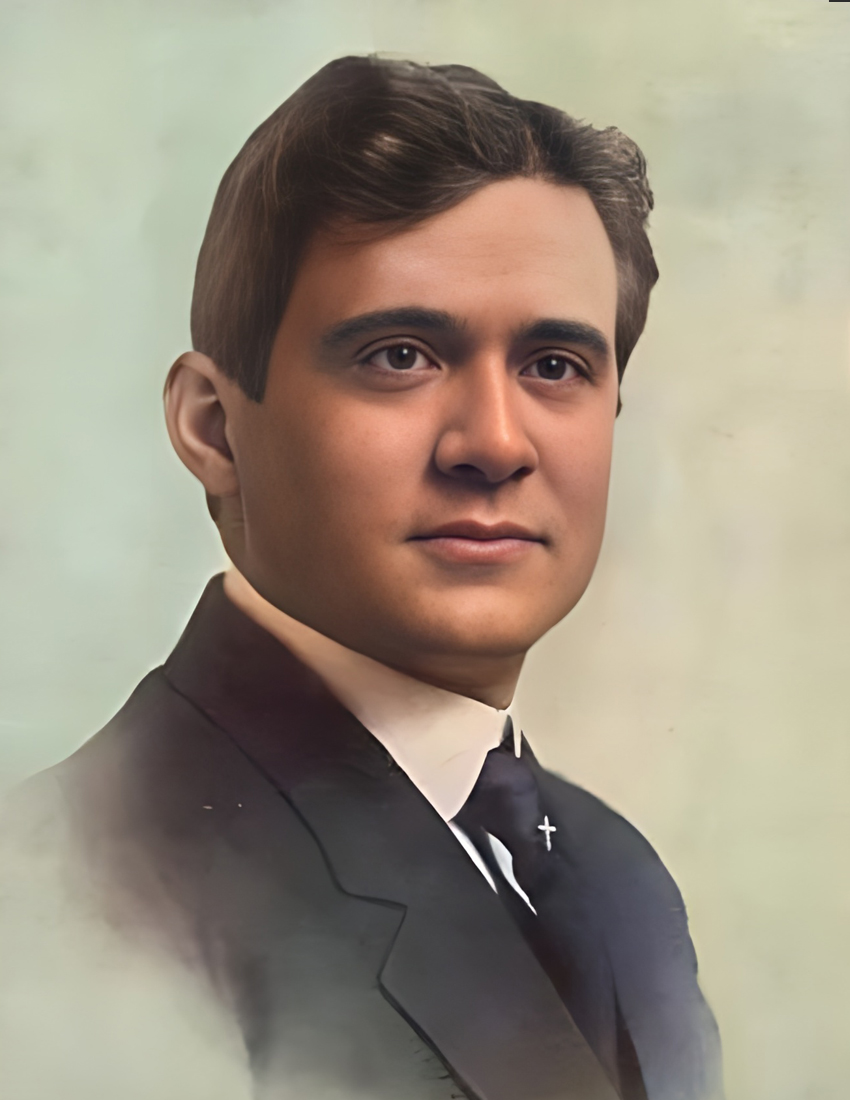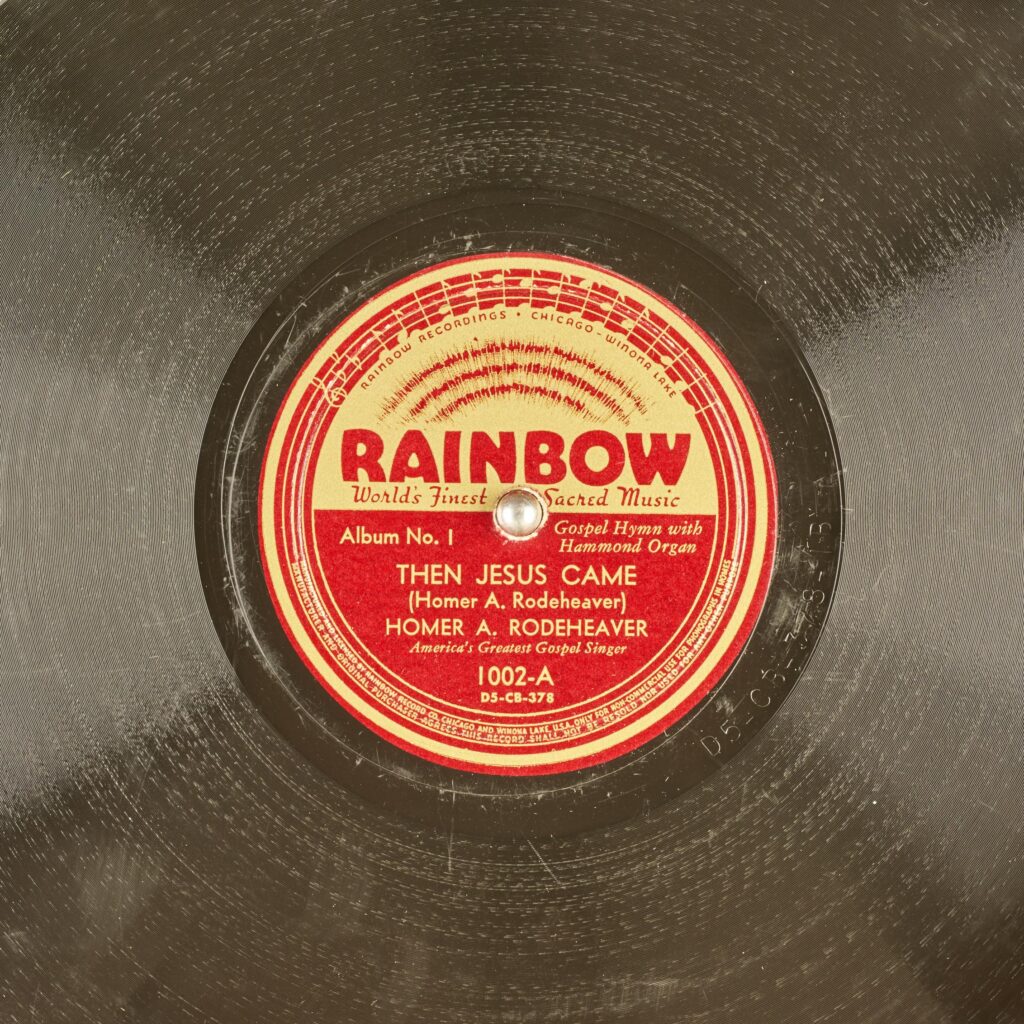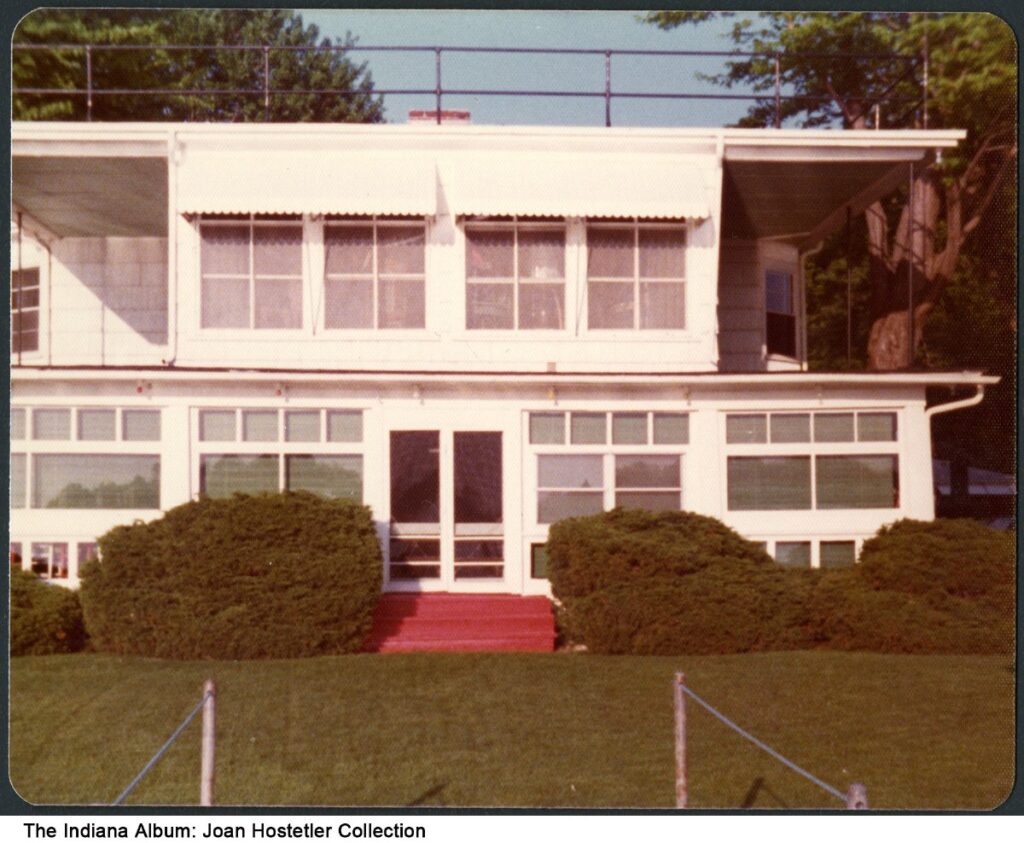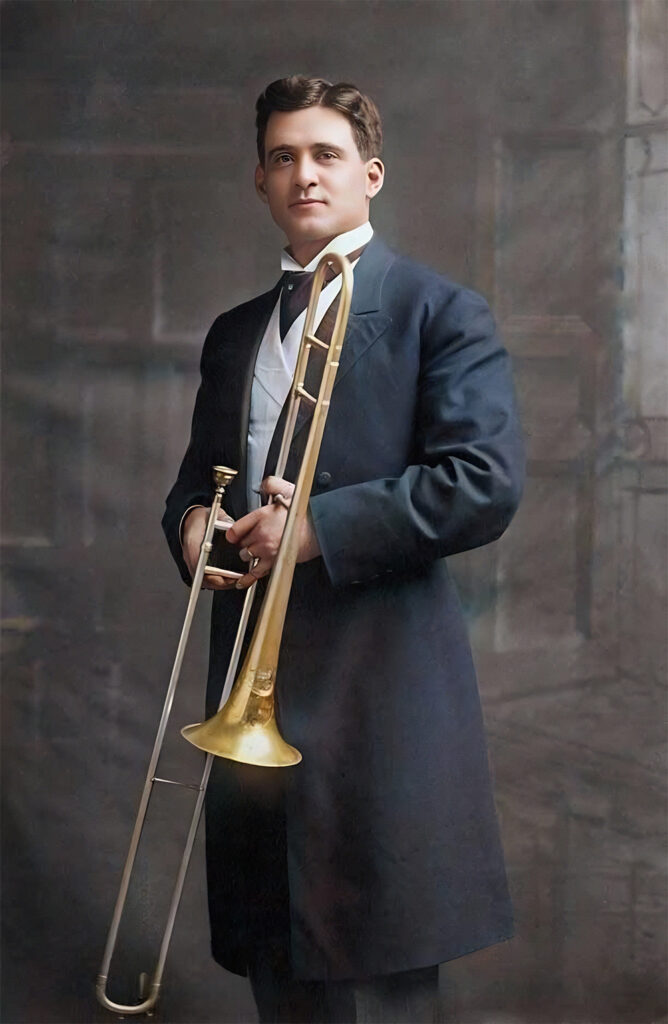Born: October 4, 1880, Union Furnace, OH.
Died: December 18, 1955, Winona Lake, IN.
Buried: Oakwood Cemetery, Warsaw, IN.
Homer Rodeheaver

The Story Behind “Then Jesus Came”
“Then Jesus Came,” Homer Rodeheaver’s most famous composition, was born from a providential encounter with Dr. Oswald J. Smith. “The way that song was born,” recalled Dr. Smith, “was like this: I was standing by the piano of B. D. Ackley in Philadelphia. We were trying over some new hymns, when suddenly Homer Rodeheaver walked into the room.” Rodeheaver approached Smith, saying, “I’d like a hymn that tells the conditions of people before Christ met them and before they met Christ; and then the change that took place and their conditions after they met Jesus. Would you be willing to write such a hymn?”
Smith agreed, recounting, “I went back to the China Inland Mission headquarters where I was being entertained in Philadelphia and sat down that evening and I wrote this hymn.”
Rodeheaver’s “magnificent music” brought Smith’s words to life, creating a powerful testimony of transformation. The hymn vividly portrays healing miracles from the Gospels, including the blind beggar, the Gadarene demoniac, and a leper. Rodeheaver’s performances were particularly moving. As Smith described, “When Homer Rodeheaver sang it, he would put up his coat collar and pretend that he was the man he was singing about. He would act it out right from beginning to end.”
This collaboration between Smith and Rodeheaver resulted in a timeless hymn that continues to touch hearts with its message of hope and redemption, beautifully illustrating the life-changing power of an encounter with Jesus.
Hear Homer Rodeheaver himself sing Then Jesus Came from this 1922 historic recording.
In the early 1920s, during the heyday of Billy Sunday’s revival campaigns, a fierce storm descended upon a crowded tent meeting in Kansas. Lightning flashed and thunder crashed as near-hurricane winds caused the tent’s top and sides to sag ominously. Panic rippled through the congregation when a quarter pole suddenly collapsed, striking a woman on the head. As people leapt to their feet, ready to flee, a clear, brassy note cut through the chaos – a trombone, played by none other than Homer Rodeheaver, the charismatic music director of Sunday’s evangelistic team.
With each resounding note, the crowd’s fears subsided, replaced by a sense of wonder and unity. Rodeheaver’s melody became a beacon of calm, holding the panicked congregation transfixed until the storm passed. This moment, etched in the annals of American evangelism, encapsulates the extraordinary power of music to touch hearts in times of fear. As Rodeheaver himself often said, “A song will often open a heart that has been closed to all else.”
From Humble Beginnings to Heavenly Harmonies
Born on October 4, 1880, in the rural enclave of Cinco Hollow, Ohio, young Homer Rodeheaver’s life was steeped in the rhythms of hard work and simple pleasures. As a child, his family moved to Jellico, Tennessee, where the young boy found himself surrounded by a mix of mountain ballads and Negro spirituals. It was here, amidst the whirring of his father’s lumber mill, that Homer’s love for music began to take root.
While the plaintive strains of Appalachian folk tunes caught his ear, it was the soulful harmonies and messages of Negro spirituals that truly captivated young Homer’s heart. These songs, with their emphasis on rhythm and religious fervor, would later inspire his own musical style and evangelistic approach.
A Musical Calling
As Homer grew, so did his musical talents. He first picked up the cornet, its bright tones a perfect match for his cheerful personality. But it was at Ohio Wesleyan College that he discovered his true instrumental soulmate – the trombone. This brass behemoth would become his trademark, a tool for both musical expression and divine intervention.
Homer’s college years were marked by a curious blend of sacred and secular pursuits. While honing his musical skills, he also served as a cheerleader, perhaps unknowingly preparing for a future where he would lead crowds in a different kind of cheer – one of spiritual exultation.
The Spanish-American War of 1898 called Homer away from his studies, thrusting him into the Fourth Tennessee Band. This experience, though brief, broadened his horizons and deepened his understanding of music’s power to unite and inspire.
A Divine Partnership
It was in 1910 that Homer Rodeheaver’s life took a turn that would define his legacy. He joined forces with the renowned evangelist Billy Sunday, forming a partnership that would last two decades and touch countless lives. As Sunday’s music director, Homer found his true calling – using his musical gifts to open hearts to the gospel message.
Rodeheaver, affectionately known as “Rody,” was a natural showman with a gift for connecting with audiences. His warm personality and quick wit disarmed even the most skeptical listeners. He would often quip that his instrument was a “Methodist trombone” that would occasionally “backslide,” or pull his lips from the mouthpiece and exclaim, “Just imagine! I’m being paid just to do this!” These moments of levity served a greater purpose, preparing hearts to receive the more serious messages to come.
Rodeheaver’s effectiveness as a music director was widely recognized. In advance of Sunday’s 1917 New York City Campaign, which reached over one million people and reported over 98,000 conversions, The New York Times lauded Rodeheaver’s skills:
“Most prominent outside the Sunday family is undoubtedly Homer A. Rodeheaver. ‘Rody’ is usually one of the most popular members of the party. Schoolboys like him tremendously; so do grown men; nor are the ladies backward. Rodeheaver is musical director. He leads the singing, ‘lining out’ the hymns, getting the left half of the house to sing the first line of a stanza, the right half the second line, the choir the third and the whole congregation the fourth. He can sing himself, in an oily resonant voice—a good voice, as gospel singers go. And he plays the trombone to lead the choruses with devastating effect. Rodeheaver is a man of immense value. Whatever he gets for his services, he is worth it. A man with his mixing ability and his capacity for molding a crowd into just the right state of mind in preparation for Sunday’s arrival would be worth a fortune to a political leader.”
The Trombone That Saved Souls
In an era before electronic amplification, Rodeheaver’s trombone became more than just an instrument – it was a beacon of sound that could cut through the noise of even the largest gatherings. He developed a unique style of leading congregational singing, starting with his trombone, then seamlessly transitioning to conducting, all while letting the instrument hang casually from his elbow.
This innovative approach proved invaluable during Billy Sunday’s massive revival campaigns. Rodeheaver found himself directing choruses of hundreds, sometimes thousands, of volunteers. His ability to blend popular gospel songs with classical pieces like Handel’s “Hallelujah Chorus” demonstrated both his musical versatility and his understanding of what moved people’s spirits.
Rodeheaver himself eloquently described the effect his trombone had on audiences:
“A trombone. Its voice, resonant, silver toned and clarion clear, rings through the big, hastily raised tabernacle smelling of raw pine lumber and sawdust and the damp earth that has been scuffled and stamped by hundreds of thousands of feet. It sounds through the throng of sixteen thousand and more men and women who are packed shoulder to shoulder along the planed benches, who crowd the aisles, who elbow for standing room about the platform. As its sound swells, all along the ranks there is a stir, a shifting, a quieting of voices, a quick intake of breaths. And after that a silence that is, to me at least, more inspiring than the full thunder of a great crowd’s applause. For I am the man with the trombone.”
A Home Like No Other
As Rodeheaver’s fame grew, so did his desire for a unique personal sanctuary. In 1912, he purchased an old farmhouse on “Rainbow Point” at Winona Lake, Indiana. True to his theatrical nature, he had it rebuilt to resemble a ship, complete with a railing around its flat roof. This whimsical abode became a gathering place for an eclectic mix of guests – preachers, businessmen, opera singers, and radio personalities. Sometimes hosting up to twenty visitors at a time, Rodeheaver’s home reflected the man himself – welcoming, unconventional, and always ready for a song.
The Bachelor Evangelist
Despite his charm and popularity, Homer Rodeheaver never married. Bob Jones Jr., in his book “Cornbread and Caviar,” painted a vivid picture of Rodeheaver’s romantic escapades:
“Rodie never married, though he had a few very close brushes with matrimony and once or twice a suit for breach of promise. He loved to be surrounded by women of charm and beauty, and with them his manner was always extremely gallant. I doubt if he was ever seriously in love with any woman. He was just in love with the idea of romance itself.”
This gallantry was not lost on those around him. Mary Gaston Jones, wife of evangelist Bob Jones Sr. and Bob Jones Jr.’s mother, was known to quip, “Here comes Homer with his oil can,” whenever Rodeheaver approached, a reference to his smooth and charming demeanor.
A Legacy in Song
While Rodeheaver composed several gospel songs himself, including his most famous, “When Jesus Came,” his true legacy lies in his promotion of other songwriters’ works. He had an uncanny ability to recognize songs that would resonate with congregations, most notably “The Old Rugged Cross” and “In the Garden.” These hymns, through Rodeheaver’s marketing, became cornerstones of American gospel music.
Rodeheaver’s favorite scripture verse, Colossians 3:16, seemed to encapsulate his life’s mission: “Let the word of Christ dwell in you richly in all wisdom; teaching and admonishing one another in psalms and hymns and spiritual songs, singing with grace in your hearts to the Lord.” As I reflect on this verse, I’m struck by how its timeless wisdom continues to resonate. In fact, my own publishing company, Hearts to God Music, draws its name from this very passage. This verse guided Rodeheaver’s approach to music ministry, emphasizing the power of song to teach, admonish, and uplift.
The Birth of an Industry
Homer Rodeheaver’s impact extended far beyond the revival tent. In 1910, he founded the Rodeheaver Company, a music publishing business that would play a crucial role in the development of the gospel music industry. His gift of recognizing a great song no doubt was the spark that ignited his publishing empire. This venture, along with his later creation of Rainbow Records – the first record label devoted solely to gospel music – helped to professionalize and popularize gospel music on a national scale.
A Life Well-Lived
As the years passed, Rodeheaver’s influence only grew. He founded Rainbow Ranch (later renamed Rodeheaver Boys’ Ranch) in Palatka, Florida, providing a home for abused and abandoned boys. He created the Rodeheaver School of Music at the Winona Lake Bible Conference, nurturing the next generation of church musicians. Even in his travels, he found ways to spread joy through music – famously playing “Brighten the Corner” on his trombone while floating in the Dead Sea.
Homer Rodeheaver passed away on December 18, 1955, leaving behind a legacy that continues to echo in churches and gospel choirs around the world. His life serves as an example to the power of music to uplift, unite, and inspire. From the humblest of beginnings in the hills of Tennessee to the grand stages of Billy Sunday’s revivals, Rodeheaver’s journey reminds us that a life dedicated to sharing joy and faith through song is a life well-lived indeed.
As we reflect on the journey of Homer Rodeheaver, we’re reminded that sometimes, the most profound messages come not from words alone, but from the blend of faith, music, and an unwavering commitment to touching hearts. His story encourages us all to find our own “trombone” – that unique gift we can use to brighten corners and uplift spirits in our own corners of the world.




